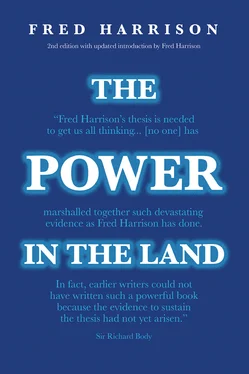It is this piecemeal tinkering with parts of the economy, however, which, cumulatively, has built up heavy income taxes, insupportable government deficits, overwhelming disincentives to the wealth-creating processes and has permitted cyclical collapse of the system. They are all hopeless attempts at mitigating the original problem. For too long, now, ‘managing the economy’ has been a substitute for a radical solution. While it provides power for politicians and jobs for civil servants, it does not create social stability and new wealth. That will be accomplished only when we finally come to terms with the monopoly of land, the one factor which is traditionally omitted from all the equations.
Because we have failed to address ourselves to this major problem, the door has been opened to the extreme left. They triumphantly claim that the capitalist system is about to terminate in one of those epoch-making Big Bangs that constitute the saltatory Marxist theory that history moves in stages, with communism at the pinnacle of human social achievement.
But if, as we claim, land monopoly is not an intrinsic ‘contradiction’ within capitalism, the corrupting influence can be surgically removed without recourse to social transformation. We do not claim that the fiscal reform recommended here will create an economic system at its best and final stage in human organisation. But capitalism would be equipped to ensure full employment and sustained prosperity, and so able to resist its ideological enemies and last much longer than they would have us believe.
Marx regarded capitalism as the last antagonistic form of class society. Fiscal reform would lay the foundations for the removal of the antagonistic elements and enable us to refine liberal democratic society. This is a sweeping claim, the full justification for which is not elaborated in this book. Other works will have to follow. Meanwhile, establishing how the speculative booms and disastrous slumps can be eliminated from the industrial economy is the first and necessary step in the direction of a happier and more prosperous society.
Notes
1E. F. Denison, ‘Economic Growth’, in Britain’s Economic Prospects, by R.E. Caves and Associates, Washington, DC: Brookings Institution, 1968, p.236.
2 Ibid., p. 251.
3D. Hagman and D. Misczynski, Windfalls For Wipeouts: Land Value Capture and Compensation , Chicago: American Society of Planning Officials, 1978, p. 123.
4J. Steindl, ‘Capitalism, Science and Technology’, in C. H. Feinstein, editor, Socialism, Capitalism and Economic Growth , London: Cambridge University Press, 1967, p.200.
5 The Federalist Papers (Introduction by C. Rossiter), New York: The New American Library, 1961, p.79.
6 Ibid, p. 80.
7 Ibid , p. 84.
8H. George, Progress and Poverty , centenary edn. 1979, New York: Robert Schalkenbach Foundation.
9G. Gilder, Wealth and Poverty , New York: Basic Books, 1981, p.42.
10J. Rees, ‘Supply-Side Economist Arthur Laffer’, The Review of the News, 6.11.80, pp. 47-49.
11P. Samuelson, Economics , Tokyo: McGraw-Hill Koga Kusha, 10th edn., 1976, p. 568.
12Among other emendations, school textbooks — with the approval of the Ministry of Education — were altered so that the Japanese ‘invasion of northern China’ was made to read ‘advance’. The description of how Korean labourers were forcibly sent to Japan was changed to read ‘mobilized’. The diplomatic row that ensued from this reappraisal of history forced the Japanese government to back-track. The new nationalistic mood, however, was firmly established. We cannot predict what this portends for Far Eastern relations. What we do know, however, is that a new 5-year plan for military procurements was adopted, and that there was a proposal to increase the 1983 defence budget by 7.3% (to £6.29 bn.)
13N. D. Kondratieff, ‘The Long Waves in Economic Life’, Lloyds Bank Review , October 1978.
14For example, W.W. Rostow, The World Economy , London: Macmillan, 1978.
15J. B. Schuman and D. Rosenau, The Kondratieff Wave , New York: Delta, 1972, p. viii.
16W. W. Rostow, ‘The Long Waves in Economic Life’, Lloyds Bank Review, July 1979, p. 53.
17Ray admits that ‘no more than guesses can be expressed’ in the search for the motive power that might drag the British economy out of the Kondratieff trough and into a new phase of sustained growth. G. Ray, ‘Innovation in the Long Cycle’, Lloyds Bank Review, January 1980, p. 26.
18W. Rees-Mogg, ‘My resumption of liberty’, The Times, 7.3.81.
2 Laissez Faire: Adam Smith’s Version
Adam Smith believed that he was recommending the economics of the free market when he wrote The Wealth of Nations. He thought that his theoretical system had, as its dynamic principle, the competitive spirit; that, within the framework of natural justice, economic growth would be enjoyed by the three ‘original great orders’ which comprised civilized society — the land-lords, capitalists and labourers. He was wrong.
Smith was not wrong in thinking that theoretically the economics of capitalist competition could function efficiently to the advantage of all. His cr tor arose from the deduction that his specific system provided such an outcome, that it would secure the dual aim of freeing people to pursue private aims while guaranteeing the natural harmony of the total system. For his was not a description of how to construct a free market: he insulated the landlords from the competitive spirit. Until this is appreciated the science of political economy will be severely limited in its influence on public policy.
For two centuries Smith’s book has been the ‘bible’ for the buccaneering entrepreneurs who built factories and mass-produced cheap goods, and for the rational thinkers — the technologists, scientists and engineers and organisational managers — who trampled theological mysticism under foot in favour of science. But when Smith penned The Wealth of Nations he betrayed the spirit of the free market. At the abstract level, his testament promoted a philosophy that relentlessly exposed the special privileges and the monopoly power that politicians and manufacturers tried to invoke to their profitable advantage, but the book also set the seal of approval on an institutional framework that crippled capitalism at its conception. And so Adam Smith’s victims were not just the toiling masses who were subjected to the tortuous economic pressures that reduced so many of them to misery. A death blow was also administered to the very idea of the free market.
Lutissez faire is now discredited because, by popular agreement, it has failed to work to everyone’s satisfaction. It was out of resignation to this ‘failure’ that the philosophy of the New Deal developed: the belief that a mixed economy would do what the free market was incapable of accomplishing. But the interpretation of the history of industrial society ever since publication of The Wealth of Nations has geen grossly defective, which is why the critics have been able to conclude that unrestrained competition is inherently evil. Collective action, collective ownership of capital and centralised bureaucratic planning are now — in degrees varying only according to vested interests — acclaimed as the remedial alternatives.
The analyses have been wrong because the historians and social scientists have taken all the tenets of Adam Smith as necessarily intrinsic to the capitalist market. They have pursued their enquiries into a malfunctioning system without questioning the necessity for those property rights which have underpinned that system; without questioning whether, had a modified configuration of property rights existed, the free market might have achieved its goals without the evil consequences which have beset industrial society. Across the political spectrum, from Marxist left to conservative right, the arguments and counter-arguments have progressed without adequate reflection on whether a reform of the principles of property ownership and the rationale which motivates the owners of these rights might be sufficient to improve the operations of the free market without recourse to those bureaucratic modifications that deny the ‘perfect liberty’ that Smith wished to attain.
Читать дальше












